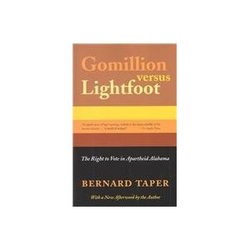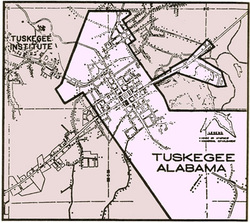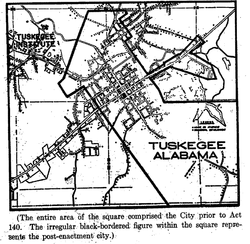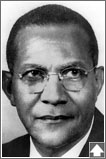Tuskegee Boycott
|
In Montgomery, Alabama Rosa Parks (born in Tuskegee, AL) sparked a protest that produced the famous Montgomery Bus Boycott, giving a major boost to the Civil Rights Movement. That boycott lasted 18 months, shutting down the city's bus system.
However, in Tuskegee, Alabama, a boycott took place that lasted almost 4 years (June 25, 1957 - February 1961), causing 75 percent of the white-owned businesses to close, and the results are seen even today. The issue of the boycott was segregation and voting rights. The voting districts for the city of Tuskegee were changed dramatically to prevent black citizens from electing local officials. The Tuskegee Civic Association, a predominantly black organization working for civil rights, challenged the new district boundaries and took it to court. The leader of the Civic Association was Dr. Charles Gomillion, a Tuskegee Institute professor. As a strategy to gain victory, he told the citizens to "Shop with your friends". This had an immediate result on the local businesses, because even though blacks were to enter stores from the rear, and had to wait for white customers, before they were served, the black populus was a significant consumer of goods in Tuskegee. During the Tuskegee Boycott, many families would travel to Opelika and Montgomery to shop. The Boycott also resulted in local Macon County black businesses thriving and multiplying. Small grocery stores became supermarkets, and the area around Tuskegee Institute spawned a community of businesses that were black owned and operated. Even in nearby Notasulga, the Carmack's grocery grew to become a well known and prominent business for the area. The local businesses lodged a suit in court against Dr. Gomillion saying that he used illegal methods in creating the boycott. However, when the judge heard that all he said was "Shop with your friends," he ruled that there was nothing wrong with the language Dr. Gomillion used, thereby dismissing the case. Eventually, Dr. Gomillion's lawsuit "Gomillion versus Lightfoote" against the city of Tuskegee, went before the U.S. Supreme Court and was decided in Gomillion's favor. The use of the gerrymander, or redrawing voting district lines was ruled illegal, and became a landmark case for the United States Civil Rights Movement. Gomillion vs. Lightfoote

This article is on the case "Gomillion vs. Lightfoote".
|
Black Citizens boycott White Merchants

This is an article on the Tuskegee boycott.
Tuskegee Negroes Boycott White Stores for Votes

This article from the Honolulu Record, August 8, 1957 discusses the Tuskegee boycott.
Trade Falls Off

This article is from the Times Daily, September 17, 1958 edition. The title for the article is: "Trade Falls Off: Tuskegee Boycott End Not Yet in Sight".
Hosea Guice's Testimony
Hosea Guice was the Community Organizer for West Macon County, to secure voting rights for citizens through the Tuskegee Civic Association. This is his testimony on the corruption taking place in the Macon County Voter Registration office. |
